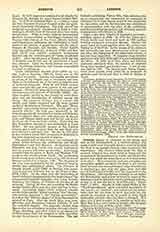

Lully, JEAN-BAPTISTE, composer, b. near Florence in 1633; d. at Paris, March 22, 1687. He was brought to France when quite a child by Mlle de Montpensier. Having great natural gifts as a violinist, he was soon promoted to be one of the king’s band of twenty-four violins, and leader of the private band. He composed a number of popular songs, including “Au clair de la lune”, as well as much dance music and violin solos, and he revolutionized the orchestra by his methods. After a study of theory and composition under celebrated masters he set music for the court ballets, and was appointed composer to the king, and music master to the royal family. After his marriage in 1662, he became on very intimate terms with Moliere, with whom he collaborated in ballets until 1671. A clever diplomatist and thorough courtier, he completely won the royal favor, and in March, 1672, he succeeded in ousting Abbe Perrin from the directorship of the Academy of Music. Thenceforward his success as founder of modern French opera was unquestioned, although Cambert, in 1671, paved the way. From 1672 to 1686 Lully produced twenty operas, showing himself a master of various styles. His “Isis”, “Thesee”, “Armide”, and “Atys” are good specimens of operatic work, and he not only improved recitative but invented the French overture. Nor did he concentrate his abilities wholly on the stage: he wrote much church music. As an artist he was in the first rank, though as a man his ethical code was not of the strictest. His death was caused while conducting a “Te Deum” to celebrate the king’s recovery, as, when beating time, he struck his foot inadvertently, causing an abscess which proved fatal. At his decease he left four houses, and property valued at £14,000, and he occupied the coveted post of Secretaire du Roi, as well as Surintendant to Louis XIV.
W. H. GRATTAN-FLOOD

